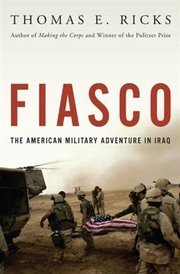 Interesting Book News...
Interesting Book News...by Claudia Parsons
NEW YORK (Reuters) - With titles like "Fiasco" and "The End of Iraq," the latest books on the Iraq war make depressing reading for Americans. Even an author who supports the Bush administration likens the war to "a shotgun wedding."
"Fiasco: The American Military Adventure in Iraq" by Thomas E. Ricks debuted at the top of The New York Times nonfiction bestseller list last week. It argues there was no post-invasion plan and documents serious errors in U.S. military strategy."It's not a book of my opinions," said Ricks, senior Pentagon correspondent for the Washington Post, noting his book is based on numerous on-the-record interviews with military officers and U.S. officials and thousands of documents.
Ricks argues that bad civil-military coordination, insufficient troops and a failure to adopt a counter-insurgency strategy immediately after the invasion caused many of the troubles in Iraq, including abuse by U.S. troops.
Bing West, an assistant secretary of defense in the Reagan administration who wrote two books on Iraq, said Ricks "does an excellent job of basically detailing the war to date."
"It obviously can't be the last word because there's more to come" in the war, West, a former Marine, told Reuters. "What I like is he names names and he names sources."
Ricks said of reactions so far, "I doubt that (Secretary of Defense Donald) Rumsfeld's office is happy but military people have been very warm."
"One battalion commander (in Iraq) wrote to me and said 'Thank you for writing what we've been saying privately."'
Equally disturbing is "The End of Iraq: How American Incompetence Created a War Without End," by Peter W. Galbraith, a former ambassador to Croatia and an adviser to Washington's Kurdish allies in Iraq. He argues the U.S. invasion destroyed hopes for a unified country of Sunnis, Shi'ites and Kurds and calls for a partitioned Iraq.
Calling America's grand ambitions for the Middle East a failure, he argues Iraq is "in a catastrophic civil war."
Another major new book on the war is by Fouad Ajami, an American professor of Middle East studies who has frequently advised Bush and his closest aides.
He said the aim of his book, "The Foreigner's Gift," was to shed light on Iraq and its people from an Arab point of view.
Ajami, who maintains the Iraq war was legitimate, writes about meeting leading Iraqi figures such as Grand Ayatollah Ali al-Sistani, a reclusive cleric who wields huge influence among Iraq's majority Shi'ites. Ajami argues that Iraq's present woes stem from Sunni Arabs' refusal to yield power to Shi'ites.
An academic who worked for Rumsfeld's former deputy Paul Wolfowitz at Johns Hopkins University and a Shi'ite born in Lebanon, Ajami says he is "one of the very few people who's friendly" to the Bush Administration in academia.
Yet he too paints a bleak picture of Iraq and the war.
"It was a shotgun wedding. We went into a country we did not know, in a region that we really didn't fully understand," Ajami told Reuters. "One of the questions that haunts this war is if they knew then what they know now... If they'd known what the casualties would be in blood and treasure, would they have pulled the trigger? I don't know the answer."
Wade Zirkle, a former marine who founded a group called Vets for Freedom "to give a pro-mission veterans' perspective," said it was discouraging to see a book titled "Fiasco."
"I feel like people are already penning the obituary on this war," he said. "It's still winnable in my opinion."
Ricks agreed there was still some hope: "I still think there's a chance to turn things around in Iraq, a small chance. That's one reason I gave the book a provocative title."
1 comment:
That's weak. Although the book sounds applicable and consistent with my/our readings, I am jealous because you tapped somebody's work from Reuters to highlight your blog. Reuters...more like...I have nothing to make fun of Reuters about.
Post a Comment